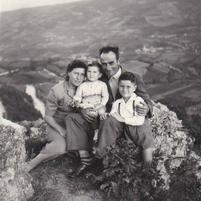In 2005, the UN designated 27th January as International Holocaust Remembrance Day. Movies and documentaries about the shoah are regularly shown on TV, reminding us of the horrors that took place during WWII. This time of the year, for my family, always means remembering the story of my grandfather. We are not Jews; we are Italians, and this means that my family was caught up in the events of WWII. In this blog post, I would like to reflect on how history, and in particular my grandfather’s history, have shaped my family and how the legacy of the past still lives in younger generations.
My grandfather’s name was Mario. He was only 20 when the war began. He had been deployed to Libya but he escaped and, after an incredibly strenuous trip that lasted more than a year, he returned close to his home village in the north of Italy. My grandfather didn’t want to fight, he wanted to go back home and help his mother, a widower who had no support during the war. The thought of his mother alone under the bombs had tormented him for all those months. He was very close to home but still had to walk a few kilometres when he encountered history. Unfortunately, my grandfather couldn’t know that venturing out on 8th September 1943 - the day when Italy agreed an armistice with the Allies - would change his life, for the worse. He was caught by the Germans, and being young and Italian, he was taken to a concentration camp in Germany. By that time Mussolini, together with the Nazis, had organized the Italian Social Republic in the northern part of Italy, a puppet regime with the aim of restoring a Fascist state in Italy. My grandfather and his fellow detainees were asked if they wanted to go back to Italy and fight for the Italian Social Republic. My grandfather refused to fight for the Fascist regime and became a prisoner in the camps, where he stayed for two years. After his camp was liberated, in 1945, he walked back to Italy through what remained of Europe, along with other survivors. When he arrived to his village, his hair and beard were so long, his face so emaciated, and his body so thin, that even his own mother didn’t recognize him.
I have often thought about this moment in his life. How was he able to survive, after witnessing the cruelties perpetrated in the camps? Where did he find the strength to tidy himself up and start a new life? How could he cope with all the pain and suffering he had experienced? I don’t have the answers, I just know that he did. He soon found a job in a factory and reconnected with Jole, a young woman from the village nearby, who he had dated a few times before the war. She became his wife a year later.
My grandparents had two children but my grandfather didn’t talk with them about the war. At the time, many people didn’t even believe that the camps had existed. Moreover, the economic boom created a new social environment where the past had to be forgotten, in favour of what looked like a brilliant future. After years of extreme poverty, my grandparents were both fascinated by modernity. They opened a hotel and restaurant in a small village and my grandfather was the first in the valley to buy a car. Then they decided to move to the city, where they opened a café that quickly became famous because it was the first public business with a TV set.
Only years later, when the events of WWII were written in history books and had become the subject of movies and books, my grandfather started talking about his experience of the war and we discovered what was hidden under all those years of enthusiasm. He told us about the hunger he had suffered in the camps, the many times he was beaten up, the psychological tortures prisoners were subjected to. I remember that sometimes the sadness and the rage would bring tears to his eyes.
I was only a child when my grandfather started talking about that period in his life and it took me a few more years to notice that some of his habits were directly connected to his experience of the war. For example, he often recounted that dirty shoes, in the camps, could lead to punishments such as a few lashes. Only years later I noticed that he always had shiny shoes, that he polished them every day, and that he had taught both me and my brother to always clean our shoes. The most hunting memory for him was hunger and, because of this, it was not surprising that he always insisted in having our cupboards full of food. When he was close to the end of his life and had dementia, he used to sit in the kitchen, which was full of food provisions, crying because, in his mind, the cupboards were empty and he was afraid of not being able to feed the family. These are two traits that have been passed through my family, first to my mother and then to me and my brother. We still make sure that our shoes are clean before leaving the house. We still worry that there won’t be enough food.
Nevertheless, I think that the most remarkable heritage that my grandfather has left us is his love for modernity and the future. His indomitable spirit enabled him to rebuild a life and he was always striving to improve his business, his status, his house. He was passionately enthusiastic about everything that was new, and had a firm belief in a better future in spite of what he had endured. He has inspired us to give of our best and reach after our highest goals.
Sometimes I wish my grandfather was still alive, to have ice cream with him, as I did in the summer days of my childhood. I would ask him many questions, as now I can see that all these signs of his presence in our lives reveal that, not only history, but his personal experience of historic events, have marked my family’s life indelibly.
About the Author
Dr Francesca Ghillani is a Research Fellow at the Oxford Institute of Population Ageing. Francesca was awarded a DPhil in Sociology from the University of Oxford, under the supervision of Prof. Sarah Harper. Her doctoral research identified four key dynamics that regulate the interplay between ageing, migration, and bodily practices.
Comments Welcome
We welcome your comments on this or any of the Institute's blog posts. Please feel free to email comments to be posted on your behalf to administrator@ageing.ox.ac.uk or use the Disqus facility linked below.
Opinions of the blogger is their own and not endorsed by the Institute
Comments Welcome: We welcome your comments on this or any of the Institute's blog posts. Please feel free to email comments to be posted on your behalf to administrator@ageing.ox.ac.uk or use the Disqus facility linked below.













